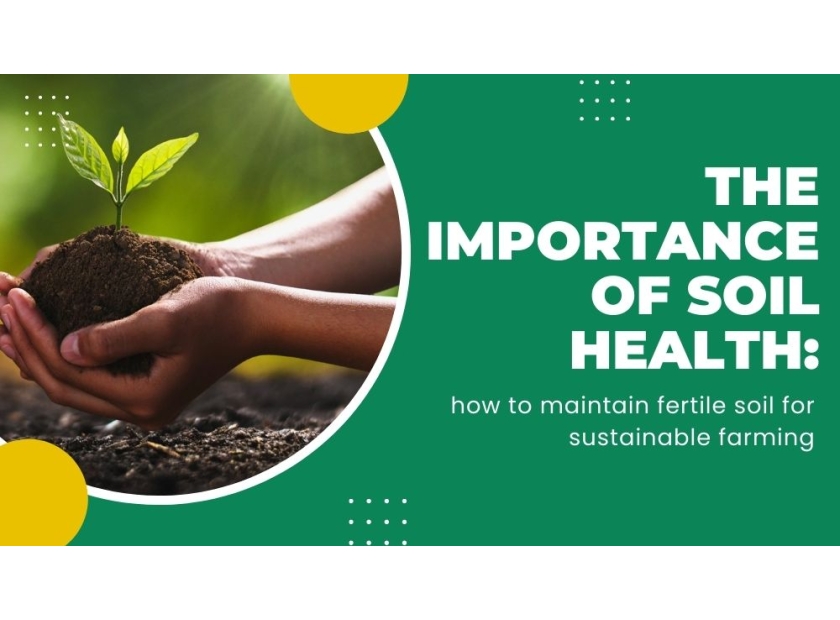The importance of soil health: how to maintain fertile soil for sustainable farming
Padgilwar Corporation, the leading agricultural equipment manufacturer in Pune, assist Indian farmers with sturdy, durable, and efficient agricultural equipment that makes their tasks easy and saves time. We also strive to educate farmers about various aspects of agriculture. In this blog, we will learn about one of the most important aspects of farming, i.e. soil – the importance of soil health and how to maintain fertile soil for sustainable farming.
Soil is a highly significant resource that keeps life on Earth surviving. It serves as the backbone of agriculture and supplies the nutrients needed for plant growth, the food provider for all human beings and animals. Sustainable farming depends on healthy soil, and preserving fertile soil is essential for both ensuring food security and preserving the environment.
Why is soil health important?
The ability of soil to support biological productivity, uphold environmental quality, and advance plant and animal health is soil health. The long-term productivity and sustainability of the agricultural and ecological systems depend on maintaining soil health. Because it affects the quantity and quality of the crops produced, soil health is essential for sustainable agriculture. Soil health is necessary for the following reasons:
Nutrient cycle: Healthy soils contain a diverse community of microorganisms that help to break down organic matter and release nutrients into the soil. Following their uptake by plants, these nutrients serve as the building blocks for plant development and food production. The nutrient cycle gets broken without healthy soils preventing plants from reaching their full potential.
Water retention and filtration: Healthy soils can absorb and store water, lowering the risk of flooding and erosion. Additionally, they function as a natural filter, removing impurities from the water before it reaches groundwater supplies. This promotes the preservation of our water resources and the upkeep of water quality.
Carbon sequestration: By storing carbon in the form of organic matter and lowering atmospheric carbon dioxide levels, healthy soils can slow the effects of climate change. Soil carbon storage can compensate for a sizeable amount of the world's greenhouse gas emissions.
Biodiversity: Soil health is critical for maintaining a diverse community of plants and animals. Healthy soils offer homes to organisms that live there, like earthworms and microorganisms, which are crucial for preserving soil fertility and nutrient cycling. They also offer habitats for organisms that live above the ground, like insects and birds, who depend on healthy soil for food and shelter.
Sustainable agriculture: Maintaining soil health is critical for long-term agricultural sustainability. Healthy soils are more resilient to drought, pests, and diseases, reducing the need for chemical inputs such as fertilizers and pesticides. In turn, this lessens the negative effects of agriculture on the environment and promotes health protection.
Maintaining soil fertility for sustainable farming
For sustainable farming, maintaining soil fertility is essential. A healthy ecosystem depends on healthy ecosystems, which support beneficial organisms that help control pests and diseases and provide crops with the nutrients they need to grow. In order to maintain fertile soil for sustainable farming, try these methods: Farmers can use the following techniques to enhance soil health:
Soil testing: Regular soil testing aids farmers in determining the pH and nutrient content of their soil. With the aid of this knowledge, fertilizer application rates and timing can be modified to promote the healthiest possible plant growth and prevent excess nutrients from seeping into nearby waterways.
Crop Rotation: To lessen pest and disease pressure and to foster soil health, crop rotation should be practiced. It is an agricultural practice in which alternating crops are planted in a field over time. Planting nitrogen-fixing crops like legumes helps to prevent the accumulation of pests and diseases and can help to replenish soil nutrients.
Cover Crops: To prevent soil erosion and nutrient loss, cover crops are sown in between rows of cash crops. By increasing soil fertility, lowering weed pressure, and adding organic matter to the soil, they also enhance soil health.
Reduced Tillage: Tillage can cause soil erosion and nutrient loss by degrading soil organic matter and soil structure. Reduced tillage or the use of no-till techniques can help maintain soil structure and encourage the development of beneficial organisms.
Composting: Composting is the process of decomposing organic materials into a nutrient-rich soil amendment, such as crop residues and manure. To enhance soil structure, add organic matter, and give plants essential nutrients, compost can be added to the soil.
Conservation Techniques: By slowing down the flow of water across fields, conservation techniques like terracing, contour farming, and grass waterways can help reduce soil erosion. These practices can also help prevent nutrient loss and improve water quality.
Integrated Pest Management: The term "integrated pest management" (IPM) refers to a sustainable method of pest control that combines cultural, biological, and chemical control strategies. The use of chemical pesticides, which can harm beneficial organisms and cause soil and water pollution, can be reduced with the aid of this strategy.
Nutrient Management: Utilizing fertilizers in a way that maximizes plant uptake while minimizing leaching or runoff is known as nutrient management. It may entail performing soil tests to identify nutrient deficiencies and applying fertilizers strategically.
Conclusion
Sustainable farming depends on healthy soil, and preserving soil fertility is essential for both ensuring food security and preserving the environment. Crop rotation, cover crops, reduced tillage, organic amendments, and nutrient management are examples of techniques that can enhance soil health and advance sustainable agriculture. Farmers must build more resilient farming systems that are better for the environment and society.
Padgilwar Corporation, the best agricultural equipment manufacturer in Pune, since its inception in 1960, has manufactured more than 300 farming tools and equipment to help small Indian farmers gain maximum yield from their effort.
For more updates on agriculture, stay tuned with us.



